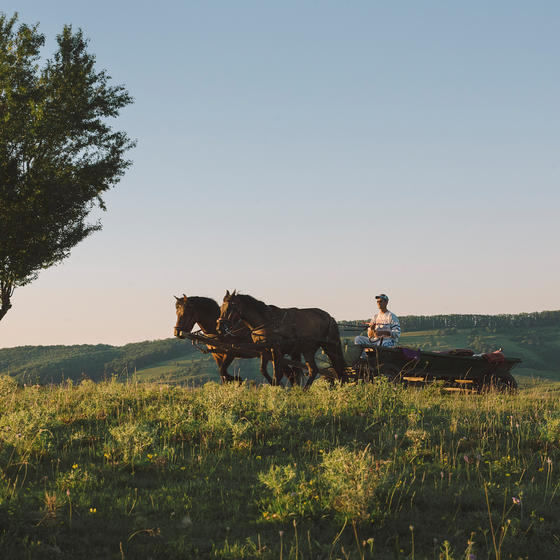09 April, 2019
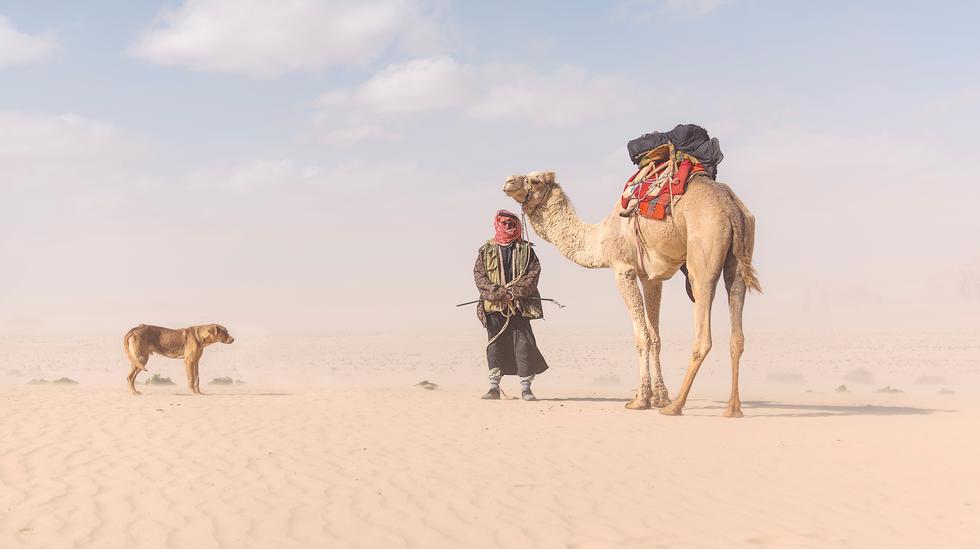
I
can count the number of times I’ve been on a horse on one
hand. It’s twice. Aged nine, I’d begged my parents for riding
lessons, romantic images of galloping across rolling meadows
filling my naïve, urbanised imagination. I think I was primarily
attracted by the smart uniform: shiny black riding boots and a coat
with brass buttons, topped by a velvet-sheathed helmet. The reality
was a drizzly day spent in a pair of borrowed jodhpurs that hung
off my legs like elephant skin atop a horse that was blind in one
eye and kept veering off to the left. I’m convinced this was
premeditated to put me off – and it worked.
Ten years later I found myself on a horseback tour of a coffee
plantation in Costa Rica, during which I got severe sunstroke and
learned that denim hot pants and a crop top are not appropriate
riding attire. It’s safe to say that horsewoman I am not – but in
the name of travel journalism I was to be back in the saddle, this
time in Jordan.
While most travellers flock to gawp at the ruins of Petra – since 2007, one of seven
New Wonders of the World – its sandstone palaces and temples
immortalised in Indiana Jones and The Last Crusade, the
photographer Mark and I were delving deeper, following in the
footsteps of the merchants who journeyed along the Silk Road bringing stories and spices from the
East. Our route was to take us from Petra far into the desert of
Wadi Rum, and we were to do it on horseback.
“You’ll fall off, get your foot stuck in the stirrup, be dragged
along like a rag doll and that will be that.” It’s with this
sure-fire vote of confidence from my mother ringing in my ears that
I find myself somewhere in the Hashemite mountains being given the
once- over by a handsome chestnut mare, Nasma, who is eyeing me
warily while stamping her feet and snorting with pointed derision.
My tentative offer of a hand to her velveteen nose is met by a
haughty toss of the head, boding well for the fact that I am
relying on her as transport for the next five days. I glance over
at Mark, who is limply holding the reins and staring at his frisky
steed with a look of bemused terror. He has never been on a horse
before.
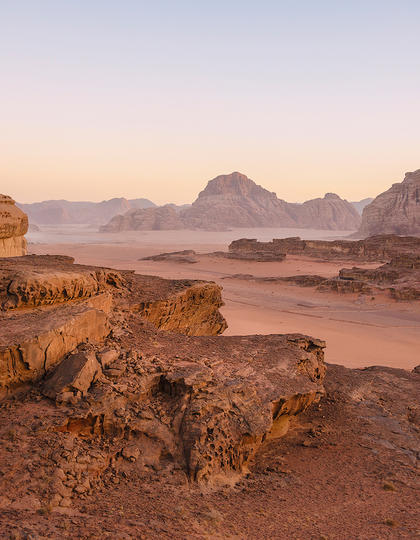
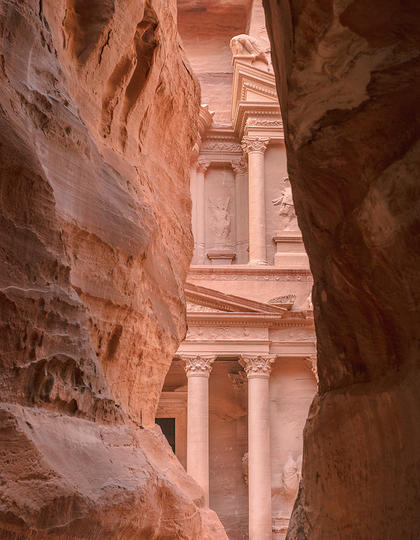
We make a slow, stately pilgrimage towards Petra, involving
several long hours of leaning backwards to stop the horses from
tripping and falling. This brutal ab workout is quickly forgotten
as we round a bend into a mountain clearing. There, shimmering like
a copper two-pence piece amid an arid plane, a glorious labyrinth
of palaces, tombs and temples shoots out of the landscape,
ethereally illuminated by the midday sun. The flame-coloured
Grecian façades flicker and change colour with the light,
whispering mystical tales of a bygone era that seem to hang in the
air. A mixture of sand, wind and ogling makes my eyes as parched as
the desert. I close them and can practically hear the cries of
ancient traders selling their wares – gold, frankincense, myrrh,
tea, porcelain, ivory. Today, business-minded Bedouins with
kohl-rimmed eyes have set up stalls along the sandstone avenue,
peddling their own treasure to star-struck tourists – lumps of
turquoise as big as my fist, carved bronze swords, boxes inlaid
with mother of pearl and piles of hand-worked silver. Over 1,500
years later, perhaps it’s not such a different scene after all.
Our resting place for the night is a Bedouin cave in the
foothills just outside the settlement. Cut into the mountainside,
it’s quite literally a cavern with whitewashed walls and a ceiling
blackened by smoke. But our cook, Jehad, and helper, Abdullah, have
arrived before us and transformed it into a den of raffia mats and
colourful blankets. I find familiarity in the smell of the gas
camping stove, which takes me back to Norfolk summers spent pootling
around on my father’s little cabin boat. It’s a glowing beacon of
warmth, and a cup of syrupy-sweet black tea is thrust into our
hands upon arrival. The heady fumes remind me of my grandmother and
I clutch the hot thimble in both hands, desperately trying to draw
its heat into my body. Our isolated location means that it’s with
astonished delight that we find a Bedouin family living in their
own cave on the other side of our mountain rock. It’s a bucolic
humdrum of scampering goats, donkeys and a camel with her
ten-day-old calf. Like Bambi on ice, it struggles to stand up,
toppling over and crashing into its mother in a charming attempt to
suckle.
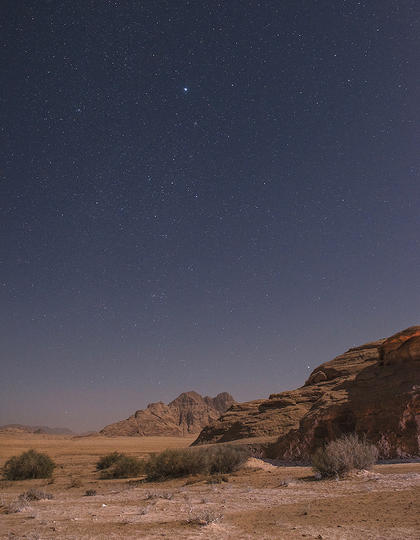
Night is casting its spell over the landscape and I pull my hood
up. Noticing me shiver, the family beckons us inside where a
cloaked woman is on her knees, deftly kneading viscous dough. She
neatly inserts it into the oven and covers it in hot coals; in ten
minutes, a perfect disc of golden bread emerges which she tears
into hunks and hands to each of us. As the week goes on I
experience a level of hospitality that I have never known before.
Abdelhadi explains that, in Jordan, it’s customary to prepare extra
food in case of an unexpected guest. “Food tastes better when
shared,” he shrugs. There’s always a pot of tea brewing and the
most important room in the house is the guest bedroom, which
remains largely empty but is always impeccable. This altruism is
reflected on a national scale; Jordan has taken in around a million
refugees from Syria, Yemen, Pakistan and Iraq. When the government
decided to hold newcomers at the border, locals went to them
bringing food, shelter and comfort.
We wake for sunrise, which gently caresses the rugged landscape
as we stir from our slumber. The horses are “spirited” (Abdelhadi
manages to put a positive spin on any wanton behaviour with a range
of diplomatic adjectives that include “excited” and “lively”) this
morning, dancing on their hooves in an attempt to warm up. Standing
still is apparently not a thing today and try as I might to halt
Nasma she pushes forward with ebullient fervour. It puts me on
edge, as the endless scape stretching out before me means there
really is nothing stopping her from careering off over the horizon.
My mother’s words echo in my ears and I’m annoyed to see Mark
pottering along happy as Larry, riding one-handed and merrily
snapping away like some sort of camera cowboy. Ever perceptive,
Abdelhadi senses my unease and rides beside me, regaling me with
nostalgic stories of a simple, hardy childhood in which he could
ride a horse practically before he could walk, of goat herding and
fighting off wolves, and of the first time they got a television,
when a Bedouin elder was convinced the news anchor was smiling at
him, prompting him to demand her hand in marriage on the spot. He
knows the landscape like the back of his hand and can read it like
a book, pointing out various herbs that are used in Arab medicine
and using the mountains to guide our way. We’re crossing Wadi al
Haraza, nicknamed “Necklace Valley” after a shepherd unearthed
treasure here. After a long day riding we pitch our tent and smoke
mint shisha under a sky that has adorned herself with every diamond
in her jewellery box.
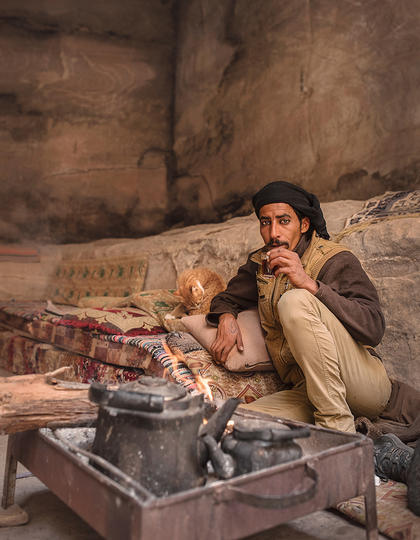
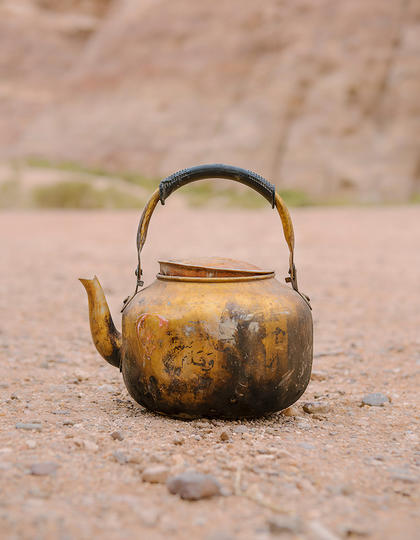
The weather is getting worse. Due to our deadline we’ve embarked
on the trip a month earlier than advised; a rare Arctic front is
moving in and snow is falling in the mountains near Amman in the north of the
country. It’s another quick march across the desert and I’m struck
by how the colour of the gnarled earth changes – mauve, auburn,
bleached – as we continue. We cut short our day riding, stopping
after a lunch of tinned sardines, crispy falafel, hummus spliced
with zesty burgundy-blue sumac and tomato salad mixed with silky
tahini, which we cram into soft flatbreads. Jehad’s unending
ability to rustle up veritable feasts from a small cool-box is
nothing short of astounding.
The wind is whipping up the sand in a frenzy. Mark and I head
out for a walk during which we find camel-racing champion Ali
sheltering in his own enclave. We lose track of time as we drink
more tea and smoke more shisha (this time black molasses). It’s
dark by the time we return and I can’t see my hand in front of my
face for sand. We hunker down in our tent and settle in for the
night. Suddenly a young boy, Ahmed, scampers in, tailed by his
father, both seeking haven from the sandstorm. If desert-dwelling
nomads are sheltering in your tent, you know there’s one hell of a
tempest brewing.
Between pinning down the tarpaulin with rocks – we have no
groundsheet and the wind enters the tent like a torrent, creating a
sort of hellish sand vortex – Jehad whips up a homely meal of fish
and chips followed by sticky baklava and cardamom-infused coffee,
which we share with our new companions. I try to read my book, but
the pages flutter and my face is treated to a sandy exfoliation. I
give up and pull my sleeping bag over my head. I can’t help but
think about the thousands of displaced people for whom this is a
daily reality, often without an end in sight. Then I hear an
increasingly loud humming through the darkness. Mark is singing the
1990s dance hit Sandstorm, complete with dramatic sound effects. I
collapse into fits of hysterical laughter before falling into a
deep sleep. During the night, I feel someone throw a heavy blanket
over me, tenderly tucking it around my body. I’m cold, stiff and
dirty, but I have an all-encompassing feeling of complete safety.
In that moment there is nowhere else I’d rather be.
The storm has renewed the desert, wiping it clean like a blank
canvas so that the sand is a creamy expanse of soft rivulets. The
horses are “playful” after the night’s drama, and the excitement of
the morning is Abdelhadi’s horse freeing from his post and shooting
off into the distance like a cannonball. He’s caught by a kindly
Bedouin shepherd and returns with a bashful look, eyes flashing.
It’s decided we should wait for the weather to calm before taking
the reins again; we jump in a jeep and fly across sand dunes,
keeping an eye on Abdelhadi who is expertly steering all three
horses across the desert like a modern-day Lawrence of Arabia.
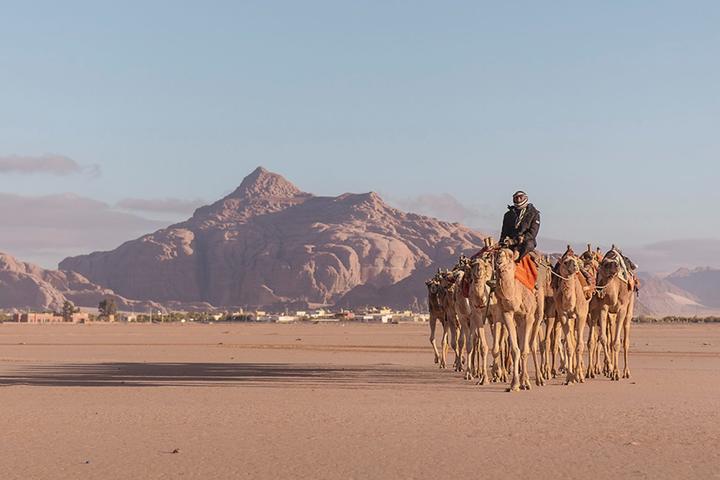
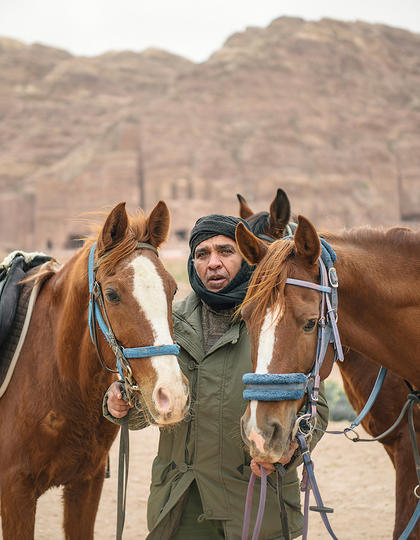
The desert climate is fickle – by lunchtime there’s not a cloud
in the sky and it’s positively boiling. Abdelhadi lets us ride the
horses bareback, which brings a new level of closeness as I feel
Nasma’s hot body move next to mine. It is also incredibly difficult
to balance and she misunderstands my tight grip as an invitation to
canter, leaving me squealing and desperately clutching at her mane
in an attempt to stay on. I thank God that I have no stirrups to
get stuck in.
We’re rewarded for our days of resilience by spending our last
night in a tented tourist camp with the luxury of a hot shower and
a proper bed. I nearly cry when the water runs over my aching body
and I leave behind an impressive sandpit in the porcelain tray.
Like the desert revitalised by rainfall, washing rejuvenates me,
and as we warm our toes by the fire that evening I feel ready to do
another week’s riding. I will probably never be a horsewoman, but I
was actually pretty good at the whole “outdoors in the elements”
thing. It’s then that Mark turns to me. “Erm India, I think your
foot is on fire.” I look down to see that my sock is smoking
gently.
“They can smell fear,” says Abdelhadi – our amber-eyed guide and
real-life horse whisperer, renowned across the Middle East for his
equine expertise – with a cheerful wink. “Take her for a walk then
hop on.” I make another attempt at fostering some sort of comradery
between myself and Nasma (I am rebuffed again), optimistically
focusing on the fact that at least this one has two working eyes.
Then, I “hop on”.
Abdelhadi leads the way on a sleek stallion with sinewy,
undulating gaskins that ripple with every stride. He cuts a
nonchalantly cool outline in his black keffiyeh, a Gauloise
cigarette jauntily hanging out of his mouth, sending plumes of blue
smoke into the sky that are quickly whipped away on the breeze,
along with the guttural calls of the donkeys, goats and camels that
graze nearby. I am less nonchalant, more rigidly overinflated
Michelin man, as the near-freezing temperatures mean I’m wearing so
many layers that I struggle to move my arms. I’d also watched Monty
Python and the Holy Grail for the hundredth time over Christmas and
can’t stop thinking about King Arthur and his vassal “riding”
through the countryside making clip-clop sounds by clacking coconut
shells together in place of a non-existent horse. My attempts to
explain this English humour to Abdelhadi are met with baffled
blankness.
Our trial run is in Wadi Musa, “Moses Valley”. A far cry from
loops around a riding- school ring, we spend several hours weaving
through canyons, squeezing through ravines, ducking under trees and
clattering down the mountainside. We’ve been thrown in at the deep
end and I learn later that today is meant to test us while forging
a bond of trust between rider and horse. These animals are climbing
creatures, trained to navigate steep gradients and deftly pick
their way through loose rocks. Nasma is an expert, every so often
craning her head around as if to check I am still upright.
Relations between us seem to have thawed and I coo to her in
encouragement, admittedly more to soothe myself than her. At one
point it gets so treacherously steep that the horses stall and
we’re forced to dismount. Momentarily back on two feet, Mark jumps
at the opportunity to take his first photograph. I do not envy his
task this week.
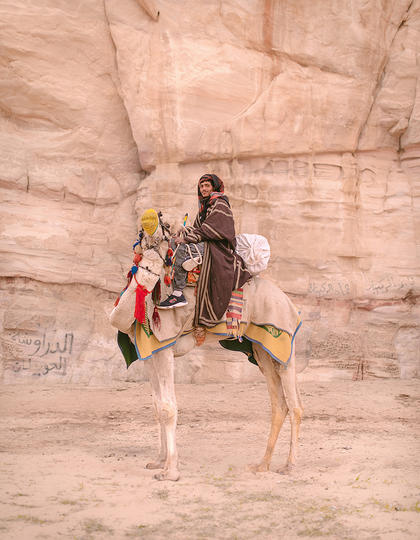
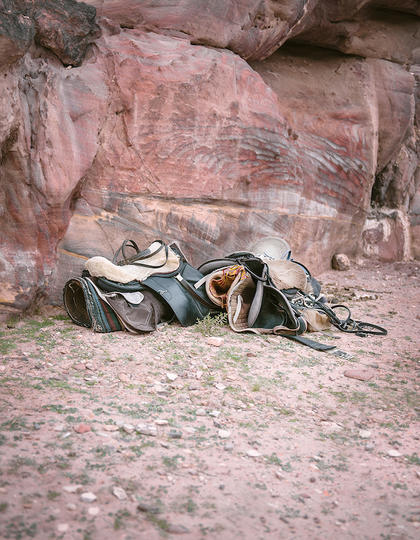
Onwards, and I relax enough to take in the surroundings.
Rose-gold mountains erupt out of the earth, majestically blooming
into whimsical formations. Like shape-shifting clouds, they seem to
have personality. Munch’s horrifying Scream face lunges out at me;
then there’s mighty King Kong; over there a human skull with hollow
eye sockets; a camel, a shark’s nose, and in the distance an
elephant. Melting wax candles, fairy grottos and dribble
sandcastles come to mind, the bruised-pink marbled rock reminiscent
of those souvenir glass bottles filled with layers of colourful
sand that you get in antiquated seaside resorts. A palette of
burnt-ochre reds meets a soft blue sky tinged with lilac, the weak
winter sun straining through the
sand-filled air so everything takes on a faded, blurry look, as if
the vista has been blotted with an old-fashioned powder puff. In
the spring, black tulips and white lilies will join the pubescent
tufts of grass that sprout out of the earth like bonsai trees,
their growth stunted by the harsh climate. I think it’s one of few
scenes that warrants use of the word “breathtaking” – and indeed,
our high altitude leaves me gasping for oxygen.
Monday. We’re up early and I savour every moment of the last
shower I’ll have until Friday. We’re off to sleep under the stars,
setting up camp where Abdelhadi sees fit, praying to the weather
gods to have mercy on us and trying to steer clear of scorpions. My
thighs are aching after just one day and I notice that Mark
shuffles towards the breakfast table with a bow-legged gait.
